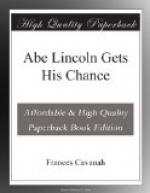“Are you the new schoolmaster?” Abe asked.
“I don’t figure on starting school till after harvest,” Mr. Swaney replied. “Will you be one of my scholars?”
“I’d sure like to come.” Abe glanced at his father.
“I reckon not,” said Tom stiffly. “Abe has had as much schooling as he needs.”
Back at the cabin, Sarah had dinner on the table. Tom cheered up as he and Dennis started “swapping yarns.” Both were good storytellers and each tried to tell a better story than the other.
Abe did not like being left out of the conversation. “Pa,” he asked, “can you answer me a question about something in the Bible?”
“I figure I can answer any question you got sense enough to ask.”
Johnny and Mathilda nudged each other. They knew what was coming. One day when the preacher stopped by, Abe had asked him the same question. The preacher had been downright flustered when he couldn’t answer.
“It’s just this, Pa,” Abe went on. “Who was the father of Zebedee’s children?”
Tom flushed. “Any uppity young one can ask a question. But can he answer it? Suppose you tell me who was the father of Zebedee’s children?”
“I sort of figured,” said Abe, “that Zebedee was.”
Everyone was laughing except Tom. Then he laughed, too. Sarah was glad. Abe had told her that Mr. Swaney was at church. She was going to talk to her husband that very afternoon about sending the children to school, and she wanted him to be in a good humor.
“What did the preacher have to say?” she asked.
“Well—” Tom was trying to remember. “What he said sort of got lost in the way he was saying it. How some of those preachers do hop and skip about!”
“I like to hear a preacher who acts like he’s fighting bees,” said Abe.
Sarah nodded. The description fitted the preacher “like his own moccasin,” she said.
“You menfolks wait outside,” she added. “Soon as the gals and I get the dishes done, we’ll be out to hear Abe preachify.”
[Illustration]
The afternoon was warm. Sarah fanned herself with her apron as she sat down at one end of a fallen log near the door. The rest of the family lined up beside her. Abe stood before them, his arms folded, as he repeated the sermon he had heard that morning. Now and then he paused and shook his finger in the faces of his congregation. He pounded with one fist on the palm of his other hand.
“Brethern and sisters,” said Abe, “there ain’t no chore too big for the Lord, no chore too small. The Good Book says He knows when a sparrow falls. Yet He had time to turn this great big wilderness into this here land where we have our homes. Just think, folks, this Pigeon Creek had no one but Indians living here a few years back. And today we got cabins with smoke coming out of the chimneys. We got crops agrowing. We got a meeting house where we can come together and praise the Lord—”




